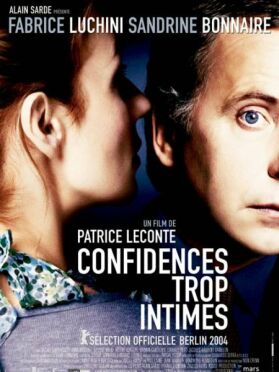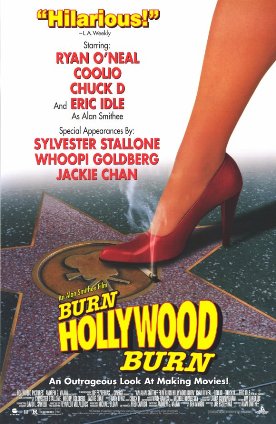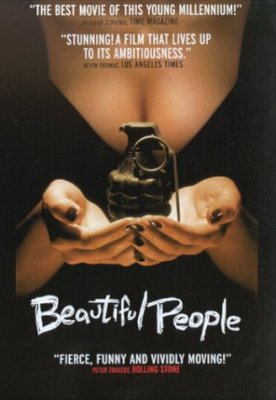Intimate Strangers (Confidences trop intimes)
“Let me ask you something, doc,” says Will Smith in I, Robot. “Does thinking you’re the last sane man on the planet make you crazy?” Er, yes, actually. It almost certainly does — though of course no doctor in a movie would ever say so. This is because movie-paranoiacs, like Smith and the heroes of The Manchurian Candidate and the just re-released Donnie Darko but unlike real ones, always turn out to have been RIGHT ALL ALONG, OK? Add to these the recent spate of movies like Michael Moore’s Fahrenheit 9/11 that show unmistakable signs of political paranoia and you’ve got to think that it’s a good time for there to have come along one of the best movies about psycho-therapy there has ever been.
The genius of Patrice Leconte (director) and Jérôme Tonnerre (writer) in Confidences Trop Intimes — inadequately translated as Intimate Strangers — was to move the psychiatrist almost off-stage and put in his place a tax lawyer called William Faber (Fabrice Luchini), into whose office a patient called Anna (Sandrine Bonnaire) — inevitably reminiscent of Freud’s Anna O — wanders by mistake. Because his own clients often feel they have to confide personal and sexual secrets, in connection with the tax consequences of a divorce, for example, Faber does not immediately realize that Anna thinks he’s a shrink. By the time he does, he has become too interested in her tale of woe — involving an impotent husband who wants her to sleep with other men — to enlighten her.
Or is he just embarrassed and so unwilling to embarrass her? We gradually come to know him as a lonely middle-aged bachelor so set in his rather fussy ways that he still follows his father’s profession in his father’s office with his father’s furnishings and his father’s now-aged secretary (HélPne SurgPre in an outstanding performance) — and desperately shy of human contact. When the boyfriend (Laurent Gamelon) of his ex-girlfriend (Anne Brochet) tells him that he is “uncool,” he replies that he knows it. “I swallowed an umbrella. Open.” But our doubts about him are trivial compared to our doubts about Anna, the would-be patient. “I get mixed up, you know,” she tells him sweetly, but it’s a little hard to believe that she could be as mixed-up as that. A real psycho-analyst might say it was no mere mistake that made her wander into his office.
The real psychiatrist in this case is the guy down the hall, the one Anna thought she was coming to see, Docteur Monnier (Michel Duchaussoy). When Faber tells her the truth and, after an initial show of resentment and anger, she continues to come back to him anyway to talk over her troubles, he goes to see the real doctor for advice. Monnier suggests she might be making it all up. “Surely not,” protests Faber, already more than half in love with her.
“Why not?” asks the doctor. “You did. A fake neurotic consulting a fake shrink — what could be more natural?”
Traditionally, the movies are just terrible about portraying the psychiatric profession. Dr Glen Gabbard, professor of psychiatry at the Baylor University School of Medicine, studied over 400 movies for his book Psychiatry and the Cinema and concluded that, “Among all those films, fewer than five had some semblance of real psychotherapy. . .The practice of movie psychiatry bears almost no resemblance to real-world psychiatry.” One reason for this must surely be that, since their patients are so often right in clinging to their supposed delusions, movie-doctors have to be wrong equally often. But another reason is that there is no profit to a movie-maker in maintaining the professional distance between doctor and patient. It’s a waste of emotional energy. That is why so many movies, from Hitchcock’s Spellbound to The Prince of Tides to Good Will Hunting to Analyze This involve romances of one sort or another between doctor and patient.
Leconte gets around this problem by putting the romance first, as the natural bias of the medium demands, and moving the doctor into a commentary slot, so to speak. Thus we get to watch the impact of the marvelous Miss Bonnaire’s half-tragic, half-comic confidences on the face of the even more marvelous Mr Luchini untroubled by the thought that this is just what he is trained for. His reactions are only human, which adds to the piquancy of the real doctor’s casual professionalism, when he is called on to react to them at second hand. The movie’s best moment comes when, after the lives of both Faber and Anna have been completely transformed by their encounter, Dr Monnier passes Faber in the hallway and, apparently oblivious to the movers and other signs of his leaving forever, asks how his sessions with Anna are going. Faber replies that she is divorcing her husband.
“Then you’ve succeeded,” says Monnier jauntily, still under the impression that Faber is merely practising amateur psycho-analysis. “That’s the aim of therapy,” he goes on to explain. “To cut the cord.”
It’s a reminder that, just off-screen, there is a world of doctors and patients acting out their assigned roles in the great cultural drama of our time, that of self-validation. Nor are they the only players. All those eternally vindicated movie-paranoiacs who look to us, the sympathetic audience, for a self-affirming second opinion are playing the same game. “See?” they are saying. “I’m right, aren’t I?” And both doctors and audiences recognize that their part in the drama is to tell them just how right they are. I doubt that Leconte and Tonnerre had the likes of Michael Moore in mind when they set out to show us how all this mummery that we have agreed to regard as therapy can at best counterpoint the moment of real human contact. But then the box-office for real human contact these days is pretty much nowhere. They’re doing well just to remind us that it exists, and that it puts the therapeutic enterprise into an interesting perspective.
Discover more from James Bowman
Subscribe to get the latest posts to your email.






